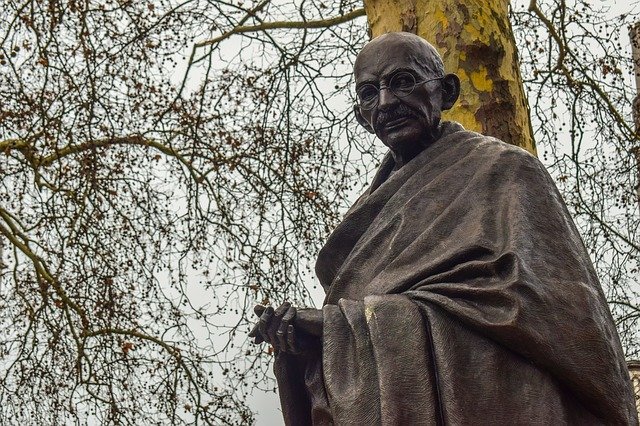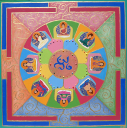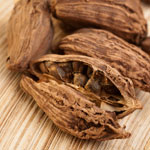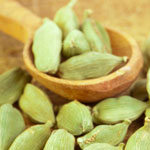
Fasten
30.04.2011 | Schon seit Urzeiten ist Fasten eine wichtige Kurmethode. In der indischen Kultur gibt es diverse Tage, an denen Leute fasten. Obwohl viele dieser Tage mit der Religion zusammenhängen, haben sie grundsätzlich eine medizinische und wissenschaftliche Basis. Von Dr. Abijith Mhalank. Artikel in Englisch
Should I fast?
Since olden days fasting has been a very important healing method. In Indian culture there are many such days on which people fast. Though these days are related to religions, they basically have medicinal & scientific basis. That’s why Mahatma Gandhi had tremendous faith in fasting cures and had always recommended them to his disciples. Many times in his own life Mahatma Gandhi had to fast, not for his health but for the atrocities of the British. Since then fasting has become an effective way to register protest against something. Leaders, politicians and protesters often go on fast whenever they want to protest against something.

Gandhi had to fast many times in life
Europe also has long tradition of fasting cures. Many Europeans fast every year, especially in spring, as they find it very healthy. Really, fasting has amazing effects. A research in the US has shown how useful fasting is for human health. This research says that anyone who fasts for 24 hours in a month has 50% less chance of getting diabetes and heart diseases. This is a very important observation, as it once again proves how effective and useful fasting can be! However in order to receive the positive effects of fasting, it is extremely necessary to follow proper guidelines. A fasting cure without proper method can prove very dangerous and instead of positive may have negative effects. In Europe and even in India one finds so many such persons who follow wrong methods of fasting and destroy their own health. One must therefore first try to understand the principles of fasting from medical perspectives and then follow them systematically.
No other system of medicine has studied, analyzed and applied the fasting methods so well as Ayurveda has. Ayurveda suggests so many different methods of fasting. E.g. one may fast continuously for 24 hours without eating anything and on getting thirsty, may just drink water. Alternatively one may fast continuously for few days, eat very little and very light food or drink only liquids like soups, juices of vegetables, buttermilk, herbal teas etc. According to the pathology and the objectives, Ayurveda recommends a suitable method of fasting.
Positive Effects of Fasting ~
Ayurveda texts describe following positive effects of fasting:
1.Fasting digests the ingested meals and also the toxins from the gastrointestinal tract, tissues and cells.
2.Fasting improves hunger, taste in mouth, metabolism, absorption and stools.
3.Fasting improves the liver function and also the functioning of glands from gastrointestinal tract.
4.Fasting increases insulin production and reduces cholesterol and sugar levels from blood.
5.Fasting removes blockages from arteries, veins and channels of body. So, food, blood and energies can flow better in the body.
6.Fasting mobilizes the toxins from deeper tissues and channels. That’s why fasting is usually recommended before purificatory treatments.
7.Properly controlled fasting improves brain functioning.
Who may fast?
Ayurveda recommends fasting for some specific diseases and patients, e.g. following people are allowed to fast:
- Overweight persons, as fasting helps to reduce weight.
- People who eat more flesh, sweets and fatty food regularly.
- Persons having Kapha constitution.
- Persons who need to sit at one place in their profession.
- Persons having high cholesterol.
Such person should fast a couple of times every year. Every time they should fast for a week or so. During this period they should eat only vegetables and drink liquids like buttermilk soups etc.
- Persons suffering from fever or diarrhea.
- Persons who get sticky stools and need to press hard during motion.
- Persons having weak digestions and not a very strong hunger.
Such persons should fast until the toxins get digested from their intestines. During that period they should just drink warm water and soups. They should not eat anything solid. In a couple of days, fever, diarrhea and other symptoms become better. Then they should gradualy resume with their normal food regimen.
Who should not fast?
According to Ayurveda following persons should not fast:
Children and older people
Very thin and weak persons
Vata constitution persons
Pregnant women and ladies who have delivered recently.
Persons who recently had a surgery.
Persons having very hectic occupations such as coolies, construction workers
Sportsmen and sports girls
Persons suffering from emaciation, high blood pressure, diabetes, heart diseases, haemoptysis.
Persons suffering from Vata diseases such as tremors, paralysis etc.
In hot summers when temperature is above 35 degrees Celsius.
In all the above mentioned situations body requires sufficient nutrition, electrolytes and water. However fasting can cause their deficiency in body. So in these cases, fasting does not prove useful but can be in fact dangerous.
So before one decides to undertake a fasting cure, one should check if he or she is eligible for it or not and then follow a right method.
From:
Dr. Abhijit Mhalank, MD (Ayu), DYA
42/677 Lokmanya Nagar, Pune 411030
Email – ammhalank@yahoo.com
About the Author:

Dr. Abhijit Mhalank is an experienced Ayurvedic physician and has specialized in Ayurvedic pathology. His several articles and books have already got published in various languages. He has also developed a CD ‘Encyclopaedia Ayurvedica’ which is a pharmacopoeia of Ayurvedic medicines in software form and contains data of thousands of Ayurvedic preparations. Apart from English, Dr Mhalank also knows German, Sanskrit and two other Indian languages and has given numerous lectures and consultations in Germany, France, Austria, Switzerland, Italy and Spain. He is regular participant in radio and television programmes.
Title Image: Bild von Dimitris Vetsikas auf Pixabay

.jpg)


.png)


.jpg)

